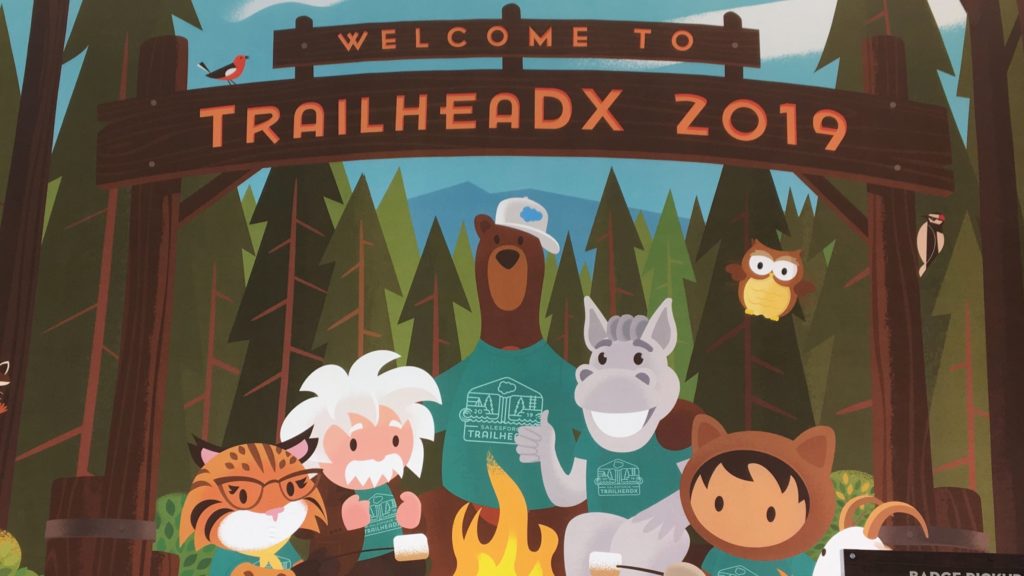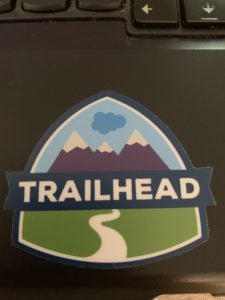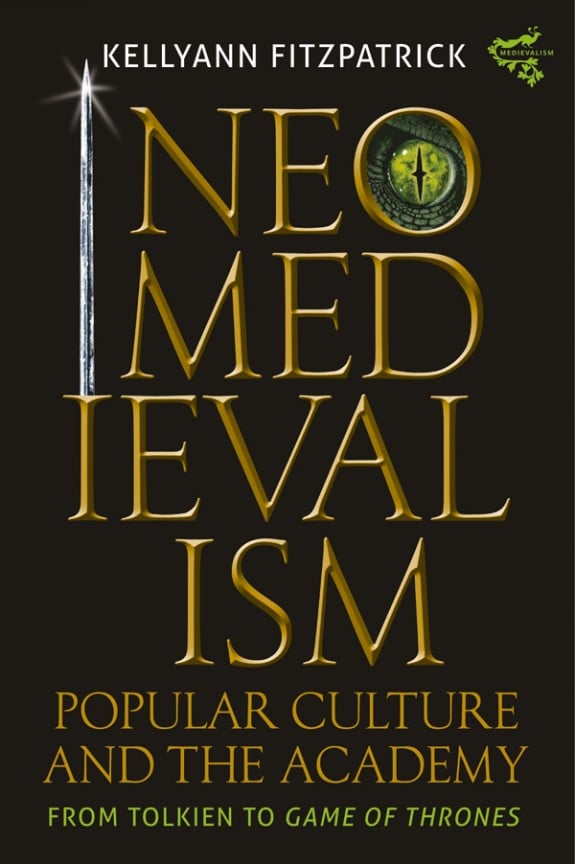
kelly (Kelly Fitzpatrick): As an analyst firm that focuses on the developer/practitioner perspective, RedMonk is fortunate in that our own Account & Engagement Manager, Juliane Leary, has been out experiencing Salesforce’s Trailhead offerings first hand (including a recent trip to a local TrailheaDX Global Gathering):
Meeting new @salesforce developer and admin friends in Portsmouth, NH this afternoon. Kicking things off is @stevebainz. pic.twitter.com/mf4P3l5I6g
— Juliane Leary (@JulianeLeary) July 25, 2019
Amidst a hectic week with both Steve and James on vacation, Juliane was kind enough to join Rachel and me for a chat about her own path to and experiences with Trailhead, and where Trailhead fits into the larger tech training/educational landscape.
juliane (Juliane Leary): Happy to have this conversation with @rachel and @kelly!
rachel (Rachel Stephens): To kick us off, could we start everyone off with an introduction to Juliane and your role with RedMonk?
juliane: Sure, I’ve been the Account & Engagement Manager at RedMonk for the past 6 years. I work with potential and current RedMonk clients. Since we’re a small firm, I wear a few hats, but most of my responsibilities fall under sales, account management, marketing, and engagement management. We work with really great clients and I’m always happy to hear about the latest trends from clients and non-clients in the software industry.
kelly: Although RedMonk is a developer-focused firm, none of us are technically developers. And yet, Juliane, you have done a lot with Trailhead recently. What drew you to Trailhead? What is the experience like?
juliane: Trailhead is a fantastic, free learning platform where you can learn about Salesforce’s products as well as other topics such as career planning or public speaking. Within Trailhead there are specific “trails” and there are “modules” within the trails so you can learn in bite size chunks that fit your schedule.
Salesforce has been a RedMonk client for a long time. I checked out Trailhead a few years ago, but I struggled a bit since we don’t use Salesforce as a CRM so I’m not an active user. However, I revisited it about a year ago and they’ve added Trailhead Playgrounds which gives learners access to a Salesforce org (loaded with data) for a hands on learning experience to complete challenges within the trails.
rachel: Was there any particular reason that drew you back to Trailhead? Are you working on any specific badges or are you just exploring new tools?
juliane: I follow Salesforce and Trailhead on Twitter. I noticed a lot of chatter about learning on Trailhead so I decided to revisit the platform. I love to just dive into things and Trailhead allows you to get your learning on immediately! It was easy and fun from the start.
Here’s the link to my Trailhead and as of today, I have 23 badges: https://trailhead.salesforce.com/en/me/jleary1.
I’m close to completing the Admin Beginner trail—just need to finish the Mobile Module.
kelly: It certainly seems like badges are part of the appeal (with total badges earned hitting 16M).
Total @trailhead badges earned
2019 16M
2018 8M
2017 3M
2016 800K
2015 50KProud of our incredible team and community empowering #Trailblazers of all walks of life to skill up for the future. #BearHugs to you all!
— Sarah Joyce Franklin (@swbjoyce) August 22, 2019
rachel: Very impressive!
You’re part of a movement.
![]()
juliane: Ha! My 23 badges seems small to some folks that have 300 plus badges, but I plug away when I can.
rachel: I think the badge concept is a nice way for learners to show acquisition of skills outside the more formal certification process. Users can go through Salesforce certifications as well, but the badges are a way to mark progress and learning achievements along the way.
kelly: It’s also part of the gamification of training and learning, of which I am a huge fan (especially when it can happen outside of a classroom or a prescribed schedule).
rachel: And I think you described a Superbadge as a badge with a project attached.
Is that correct?
kelly: That is like the level boss of badges.
rachel:

kelly: I was just giphying the same thing (but I ALMOST went Legend of Zelda)!
juliane: Correct, “Superbadges show that you can take what you’ve learned and apply it to advanced, real-world business requirements.”
rachel: What I think is nice about the Trailhead platform is that it has both advanced learning options like Superbadges and also a technology on-ramp for people who don’t code at all.
@juliane I know you’ve done some work with Moms Can Code but it sounds like a coding background is not necessary to get started. How would you describe Trailhead as a no-code / low-code experience?
juliane: You definitely don’t need to be a developer to experience Trailhead. There are different paths you can take depending upon your interests/role (admin, marketer, developer, consultant). If you are a developer and have an interest in learning more about Salesforce development, there are plenty of trails and certifications available.
rachel: I think “there are different paths” is increasingly true in today’s development environments. People are coming to Salesforce from all kinds of backgrounds and with numerous approaches. Salesforce has some challenges here:
Salesforce has been historically strong at telling the story of the Salesforce Admin. They have done a great job trying to make technology more inclusive to beginners.
On the other front, Salesforce is currently trying to open their Lightning platform to target a wider JavaScript developer base. I think that journey has been a little harder. “Salesforce Developer” is often perceived as a distinctive category. It’s a different competitive landscape (and there’s also a different level of training required) to move an outside developer into the Salesforce ecosystem than it is to advance a Salesforce Admin into a Salesforce Developer.
Trying to do both of these motions at once within a single ecosystem I think is challenging.
kelly: That does seem tricky. But if our colleague James is right about how we eventually get to 100 million developers, diverse and inclusive training paths—and platforms that remove complexity—are going to be super important
absolutely incredible job by the @cloudbees AV team to have my talk up already. here is the #DevOpsWorld closing keynote on the path to 100M developers: accessibility, inclusion, geography (eg china and nigeria), platforms, sustainability https://t.co/DUulNdeWeK
— Freedom is an absence of guns (@monkchips) August 16, 2019
rachel: Agreed! Helping people from different backgrounds get started in tech, focusing on training opportunities, and creating platforms that reduce user complexity will definitely be part of the journey to expand the developer population.
kelly: And for that reason we are definitely looking forward to seeing what training and platform news comes out of Dreamforce in November. But also, @rachel and @juliane, you both recently attended Salesforce events focused on Trailhead. What are your overall impression of those events? What is your sense regarding the other attendees at these events (and why they attend)?
rachel: Back in May I attended TrailheaDX, Salesforce’s annual developer conference. It’s significantly smaller than Dreamforce, but the goal is to gather their developer community for training, workshops, lectures, etc.
I still haven’t been to a Dreamforce but from the sound of it, it’s a crazy big event. I’ve heard in years past they’ve brought in cruise ships to help house people because there aren’t enough hotel rooms.
kelly: I can’t tell if cruise ships make me more or less likely to want to go to Dreamforce.
Pros: the Lido deck. Cons: the Lido deck.
But it sounds like the smaller, developer-focused events are much less intimidating.
juliane: Yes, last month, I attended a regional TrailheaDX event in Portsmouth, NH. It was led by the NH Salesforce User Group leader, Steve Baines. In September, I’ll be attending a regional Dreamforce, Northeast Dreamin’. Oh, and I attended a Trailhead event in Boston last spring. Each event is always fun and informative.
rachel: Salesforce does a nice job focusing on reaching people outside the Bay Area.
juliane: Plus, they always have cool stickers!

rachel:
![]()
kelly: And it seems that Trailhead is also making inroads in terms of academic partnerships, including a recently announced partnership with SNHU whereby students can take Trailhead courses for credit. I am interested to see what this means for Trailhead learners and for the competitive landscape in general.
rachel: I think university partnerships are a great way to both create geographically distributed economic opportunities for students and also help Salesforce customers access a trained workforce.
juliane: It’s great to see Salesforce partnering with colleges and universities in my local area, including my alma mater, UMass Lowell. I’ve heard that they’ve created student user groups and professors are including Trailhead in their curriculum.
I recently met a junior marketing major at UMass Lowell (let’s hear it for the marketing folks!) and she was telling me that Trailhead had been required in some of her courses.
kelly: And to my mind the earlier a company can get their tech and processes in front of potential practitioners, the more formative those tech and processes can be.
And with that, we are about at time, so here is a closing question: In a year from now, how will we be talking about Trailhead in relation to the developer training landscape?
rachel: I think Salesforce has struck on a uniquely resonant training format with Trailhead. I expect to see other vendors try to emulate the successes they’ve had with the program.
juliane: Salesforce seems to invest a lot of time and effort into developing their Trailhead community and highlighting Trailblazers that have made significant impact and achievements. It’s a smart long-term strategy to build support for their products and customer base.
kelly: For my part, I am excited to see where Trailhead goes in the next year, especially with Leah McGowen-Hare’s promotion to VP of Trailhead Evangelism (and congratulations to Leah!)
And that’s a wrap; thank you both so much!
Disclosure: Salesforce is a RedMonk client, and paid for Rachel’s T&E to TrailheaDX.

No Comments